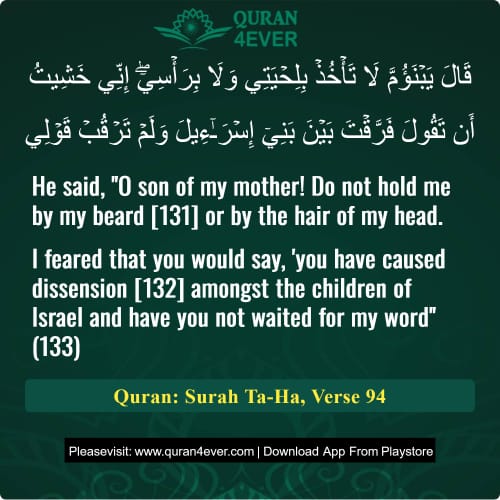
Transliteration:( Qaala yabna'umma laa ta'khuz bi lihyatee wa laa bi ra'see innee khasheetu an taqoola farraqta baina Baneee Israaa'eela wa lam tarqub qawlee )
He said, "O son of my mother! Do not hold me by my beard [131] or by the hair of my head. I feared that you would say, ‘You have caused dissension [132] amongst the Children of Israel and did not wait for my word.’” [133]
Hazrat Harun (peace be upon him) addressed Hazrat Musa (peace be upon him) lovingly as “O son of my mother!”—a gentle appeal to calm him.
His request not to be pulled by the beard or hair signifies the importance of maintaining Prophetic dignity, even in tense moments.
From this, scholars infer that a full beard (a fist-length) was the practice of the Prophets, supported by actions such as Khilāl (passing fingers through the beard) during wudhu, which requires length.
Hazrat Harun expressed his fear that if he had acted harshly, the Israelites might have split into factions, and Musa may have blamed him for causing discord rather than preserving unity.
This teaches us that avoiding internal division in the Ummah is a Prophetic priority—even when confronting major errors like shirk.
Hazrat Musa (peace be upon him), in his zeal for safeguarding Tawheed, reacted before inquiring fully.
Hazrat Harun (peace be upon him) did not retaliate or demand apology, showing that a pious person should endure such moments with patience.
From this we learn:
Do not judge pious predecessors for conflicts whose full context we may never know.
Just as we do not interfere in the disagreement between Musa and Harun, we must avoid speculating about matters between the noble Sahabah.
This verse reminds believers to approach such historical events with reverence and silence, not opinions.
The tafsir of Surah Ta-Ha verse 94 by Ibn Kathir is unavailable here.
Please refer to Surah Taha ayat 92 which provides the complete commentary from verse 92 through 94.
(20:94) Aaron answered: “Son of my mother! Do not seize me with my beard, nor by (the hair of) my head.[71] I feared that on returning you might say: ‘You sowed discord among the Children of Israel, and did not pay heed to my words.'”[72]
71. See (Surah Al-Aaraf, Ayat 150).
72. It can also be interpreted like this: You did not wait for orders from me. In order to understand fully the statement of Prophet Aaron (peace be upon him), one should read this verse along with (Surah Al-Aaraf, ayat 150), where he says: Son of my mother, these people overpowered me and were going to kill me. So, let not the enemies gloat over me. Do not count me among the people who have done wrong. Now if both these verses are read together, one can easily see the true picture of the event. Prophet Aaron (peace be upon him) did his utmost to stop the people from committing the sin of calf-worship, but they revolted against him and might even have killed him. Fearing a clash between them, therefore, he held his peace lest Prophet Moses (peace be upon him), on his return, might blame him for letting the situation worsen and failing to control it effectively in his absence. The last clause of (Surah Al-Aaraf, Ayat 150) also gives the hint that there existed among the people a good number of the enemies of the two brothers.

For a faster and smoother experience,
install our mobile app now.
Related Ayat(Verses)/Topics